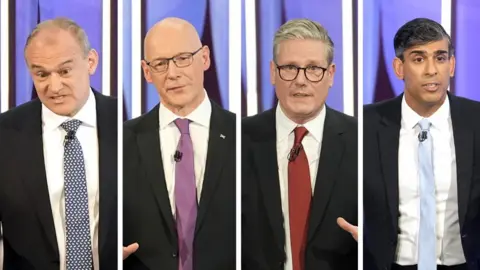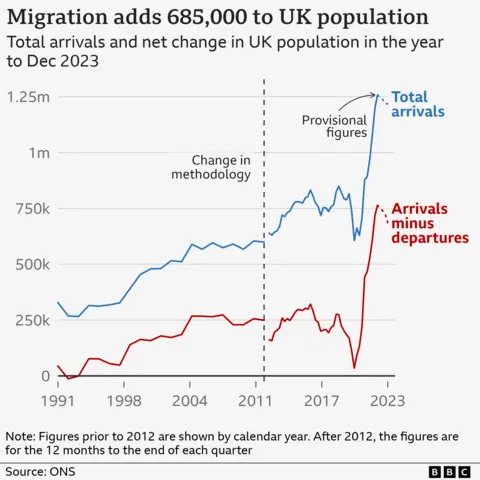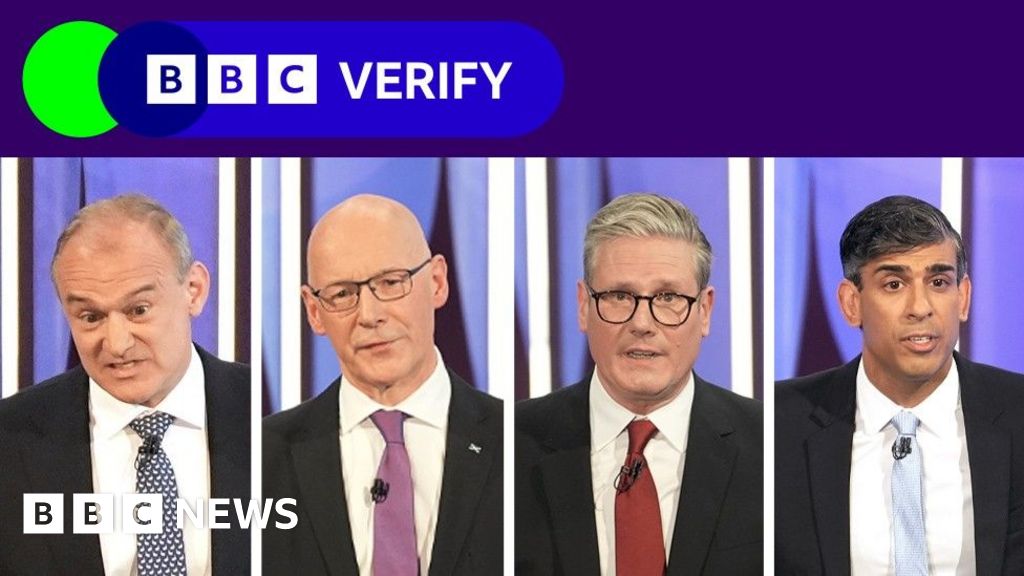2 hours agoBy Verify team, BBC NewsBBC Ed Davey, John Swinney, Keir Starmer and Rishi Sunak faced audience questions in a Question Time Leaders' Speci
By Verify team, BBC News
 BBC
BBC Ed Davey, John Swinney, Keir Starmer and Rishi Sunak faced audience questions in a Question Time Leaders’ Special. They made claims on spending, migration, Brexit and the NHS, among other issues. We examined some of them.
Conservatives’ Rishi Sunak: What’s happened to NHS spending?
The prime minister said: “There is more money going into the NHS today than there has been in its history and I’m sure BBC Verify after this debate will verify this for you.”
There are different ways of measuring how much is being spent on the NHS in England.
The health budget for this year stands at £179.6bn, which is a record amount in cash terms. You would expect that to be the case as the population grows and ages and medical treatment gets more expensive.
You can also look at what proportion of government spending is going on health and that has also been increasing in recent years.
Spending on health as a proportion of the size of the economy peaked at 12.4% in 2021 during the pandemic. It fell back somewhat in the year after that but still remained above pre-pandemic levels.
However, independent think-tank the Institute for Fiscal Studies has calculated that the government has been spending less than it planned to in its 2019 election manifesto, despite the pandemic.
The 2019 plans were for NHS spending to increase by 3.3% above inflation each year, but the IFS has calculated that it has gone up by 2.7% a year on average.
By Anthony Reuben
Are waiting lists on the way down?
Rishi Sunak just told the Question Time audience: “What we’ve seen over the past few months is waiting lists now are starting to come down.”
However, progress on waiting lists has actually “stagnated”, according to independent health think tank, the Nuffield Trust. Waiting lists now are far higher than they were when the Conservatives came to power in 2010 and higher than when Sunak pledged to reduce them in January 2023.
Last September, they hit a peak of nearly 7.8 million before falling below 7.6 million by January.
The most recent few months don’t show much progress. They’ve even risen very slightly in the latest figures released last week.
By Robert Cuffe
Labour’s Sir Keir Starmer: Is migration at a record level?

Has Labour found the money to pay for extra staff?
The Labour leader says his party is committed to delivering the NHS long-term workforce plan and that this is “fully costed”.
The Labour manifesto pledges a top-up of annual NHS England spending of around £1.8bn by 2028-29 – which includes more appointments and items like scanners.
Its manifesto also said it would deliver the NHS long-term workforce plan, which is to increase staffing considerably by 2035.
But the Labour manifesto did not outline how it would pay for delivering the extra staff.
The independent Institute for Fiscal Studies has estimated it would require NHS funding to grow by more than 3% per year and would cost billions of pounds per year of extra spending over the next decade.
By Ben Chu
Lib Dems’ Sir Ed Davey: Do Lib Dem social care costings add up?
Sir Ed Davey stressed his party had put together “a very detailed costed manifesto and it has got a big health and social care package at the centre”.
The Lib Dems are promising free personal care at home for older and disabled people in England, which they say would cost £2.7bn a year by 2028-29. The party says that would be paid for by reversing tax cuts given to big banks, raising £4.2bn a year by 2028-29.
But despite the party setting out how it intends to pay for care, the Nuffield Trust – an independent health think-tank – says the amount “looks to be inadequate”.
Sir Ed has previously defended the sums, saying the plans would save the NHS “up to £3bn or more” from fewer hospital stays.
This is based on a 2019 report by the Institute for Public Policy Research a centre-left think tank. It estimates free personal care could generate savings of up to £2bn per year, rising to £3.3bn by 2031.
Scotland, Wales and Northern Ireland set their own social care policies.
By Tom Edgington
The SNP’s John Swinney: How has Brexit impacted the UK’s economy?
The SNP leader John Swinney spoke of the “the disastrous impact of Brexit in the United Kingdom economy”.
Most economists say Brexit has had a negative impact on the UK economy, although there is disagreement about the size of the damage and the extent to which it has so far materialised.
The Office for Budget Responsibility (OBR), the government’s independent official economic forecaster, believes Brexit will mean a long-term reduction in UK national income – compared to where it would otherwise be – of around 4%, with the full effect felt after 15 years.
It says this is largely down to expected weaker productivity growth, because of lower trade and lower investment than would otherwise have occurred.
In its most recent report the OBR said that: “Overall, our assumptions about the impact of Brexit appear to be broadly on track.”
By Ben Chu


www.bbc.com


COMMENTS